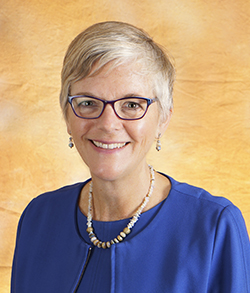Vanderbilt University School of Nursing has received a $1.43 million award from the U.S. Health Resources and Services Administration (HRSA) to develop and implement a Sexual Assault Nurse Examiner (SANE) education program for emergency nurse practitioner (ENP) students. Vanderbilt’s program is projected to increase the number of SANE-trained and certified advanced practice registered nurses practicing in emergency departments in rural or underserved communities in the U.S.
Mavis Schorn, PhD, FACNM, is the grant’s principal investigator. “Currently, there are just over 800 sites in the country that provide SANE services, yet nationally, one in six women and one in 33 men will experience an attempted or completed rape in their lifetime,” said Schorn, VUSN senior associate dean for academics. “Sexual assault nurse examiners have specialized education to conduct forensic examinations that have been shown to provide better physical and mental health care for assault survivors, deliver better evidence collection and support higher prosecution rates. Most important, SANEs treat patients holistically with compassionate and comprehensive care that takes into account the patient’s current acute care needs and the possible long-term effects of sexual assault.”
Vanderbilt will offer SANE education to incoming students in its Emergency Nurse Practitioner Post-Master’s Certificate (PMC) program. These students are current family nurse practitioners who are seeking additional education to become ENPs. They will complete SANE training concurrently with their ENP education and will be able to select adult/adolescent and/or pediatric/adolescent SANE training. The school may also offer the SANE education program to its other master-level students if openings are available.
“Positioned within emergency departments, ENPs are often the first to discover an individual has been sexually assaulted. ENPs have education and experience in providing primary, episodic and critical care of males and females of all ages,” Schorn said. “Given the likelihood of encountering sexual assault survivors in emergency departments, coupled with the diverse educational preparation of ENPs, these advanced practice registered nurses are perfectly positioned to provide sexual assault care.”
An additional aspect of VUSN’s program is its intended impact on rural or underserved areas. “Research has shown that the incidence of sexual assault in rural communities exceeds urban areas. Although data on numbers of SANE are limited, some states report few or, in some cases, no examiners in rural areas,” Schorn said. “Without access to local SANE services, survivors must travel to get this essential care from providers with specialized training. The cost and emotional toll of travel to unfamiliar locations for access to SANE serves as a barrier.”
Jennifer Wilbeck, DNP, FAANP, is academic director of VUSN’s Emergency Nurse Practitioner specialty and will work on the program with Schorn.
“We place our ENP PMC students in rural and health care professional shortage areas for their clinical experiences. In the last three years, nearly 100 percent of our ENP PMC graduates continued working in underserved areas after graduation,” Wilbeck said. “The SANE program students will have their clinical experiences in a rural or underserved area, which will translate, we believe, into them practicing in a similar underserved area where they are so desperately needed.”
In addition to Schorn and Wilbeck, the SANE project team includes Assistant Professor Keeley Bowman, DNP, RN; Associate Professor of Nursing and Medicine Melanie Lutenbacher, PhD, FAAN; and Associate Professor and Women’s Health Academic Director Ginny Moore, DNP, WHNP-BC. The program will also call upon VUSN’s simulation team, clinical practice office and technology department for additional resources.
The initiative is supported by Vanderbilt University Medical Center; Our Kids, which currently provides pediatric/adolescent SANEs in 47 Middle Tennessee counties; Nashville’s Sexual Assault Center; and EmCare, a national organization that is one of the largest staffing organizations for emergency departments.
The Advanced Nursing Education–Sexual Assault Nurse Examiner program is supported by award T96HP32512-01-0 from the Health Resources and Services Administration (HRSA) of the U.S. Department of Health and Human Services (HHS).